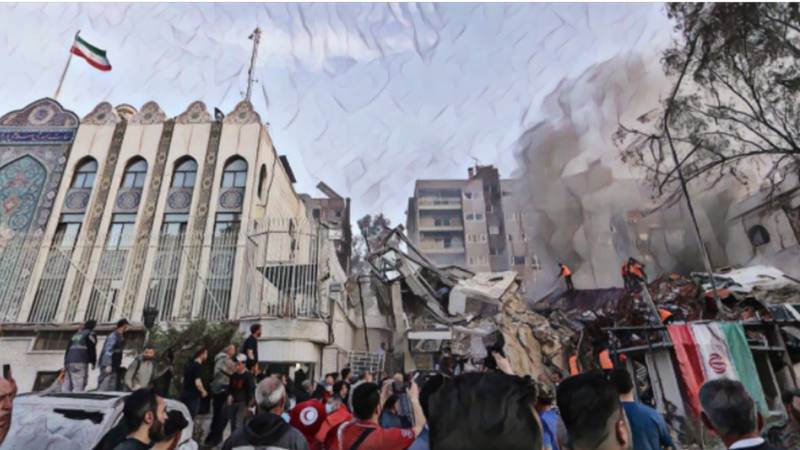
On the 1st of April 2024, the Israeli airborne onslaught on the Iranian consular office in Damascus resulted in the death of 11 people, including the Iranian Revolutionary Guards Corps Commander (IRGC) Brigadier Mohammad Reza Zahedi, his deputy and at least five IRGC advisors. Iran was quick to hit back with hundreds of drones and missiles in retaliation for the murder of its senior military officers and the damage to its consulate building in Damascus. The Iranian air bombardment failed to do any serious damage to the Israeli armed forces or the civilian infrastructure of Israel, but it was for the first time that Israel faced such a spectacle of missiles raining down on its territory. The world has waited with bated breath for a revenge strike by Israel and the Iranian strike has added fuel to the raging fires of war in the region.
All the Western nations, including those who are hardline Israel supporters, have appealed for restraint by Israel. But this may not be enough to stop Israel from retaliating, which will definitely widen the conflict in the Israel-Palestine confrontation. It goes without saying that any armed action by Israel against Iran will result in increased tensions and a widening of the conflict, with serious repercussions for the Middle East and the world community. This will heat up the growing animosity between the US and Russia, and China too could be drawn into the conflict. Far-right political factions are already pressurizing the Israeli government for an immediate, strong and forceful reply to the Iranian counter-attack. The US and other Western allies are the main providers of arms and financial support to Israel, but they are unable to restrain the right-wing government of PM Benjamin Netanyahu and continue to support Israeli aggression in Gaza while completely ignoring Israel’s killing of the Iranians in Damascus. It must be remembered that it was the Israeli attack that resulted in the Iranian response, and now the situation could possibly spin out of control with a cycle of vengeful actions and retaliations by both sides.
So far, the Israeli military action in Gaza has resulted in the death of almost 40,000 Palestinias, with many more injured and countless others made homeless. But ironically, the entire Muslim world has remained silent spectators to this tragedy. So far, Iran is the only country that has taken military action against Israel in support of Palestine. Israel has not hesitated to bomb even a column of foreign relief workers, and today, in the seventh month of war, even the staunch external supporters of Israel are calling for an immediate cease fire. Israel today stands politically isolated. Its recent actions and its conduct of war in Gaza have alarmed and mystified the world community.
The UN Security Council resolution for a ceasefire has been ignored by the Israeli government and the war has now been extended to Iran, Syria and Lebanon. The Israeli bombing of the Iranian consulate in Damascus is a flagrant violation of international law and against all canons of justice and rules of war. All these Israeli actions could be a crude attempt to divert attention from the devastating and crippling Israeli actions in Gaza strip.
The retaliatory Iranian assault on Israel is definitely a historic step. Iran was the second Muslim country after Turkey to establish diplomatic relations with Israel in 1948 and had maintained close and fraternal relations with Israel until the fall of the Shah of Iran in 1979. Since then it has been at daggers drawn with Israel. For the first time in history, the Ayatollah-led regime in Iran has launched a direct assault on Israel instead of using its many allies such as Hezbollah or Hamas or other armed militias in Iraq, Syria or Lebanon. On the other side, Israel was successful in shooting down almost 99% of all the drones and missiles launched by Iran with the help of the American, British, French and Jordanian forces. The Iranian assault on Israel is not a local or regional one but multinational one. At this moment in time when the USA is on one side and Russia and China on the other side, the Israeli response will now be a test of US credibility as the leader of the Western alliance.
President Biden warned Iran from attacking Israel, and nevertheless, they did. Now the world awaits with bated breath. An aggressive Israeli response may lead to anarchy and drag in other players in the area. A soft one, or a total lack of response, could tell Iran and its allies that acts of war could happen without any consequences. The US so far appears to be reluctant for any further escalation of the war, but Israel after Biden’s ironclad guarantees of complete support may not be that willing to avoid further action. Israeli leaders continue to provoke Hezbollah in Lebanon and the Iranian backed militias in Syria, with the intention that a wider conflict in the region will camouflage its unrelenting assaults on the Gaza strip.
President Biden has declared categorically that the US will not get involved in any Israeli military action against Iran. Israel is now under pressure not only from the USA but also from other nations of Europe for ending the conflict in Gaza. For example, even the German Foreign Minister declared, “The right to self-defence means fending off an attack, retaliation is not a category in international law.” This statement is very important as Germany is the second largest arms supplier to Israel after the USA.
Israel today faces the charge of genocide. Growing resentment and mounting pressure from the public at home is now forcing Western countries to take a second look at their policy of complete support to Israel. On the other hand, fiery statements by the Israeli government that they have the right to retaliate against Iran and to intensify their actions in Gaza have made the situation extremely volatile.

